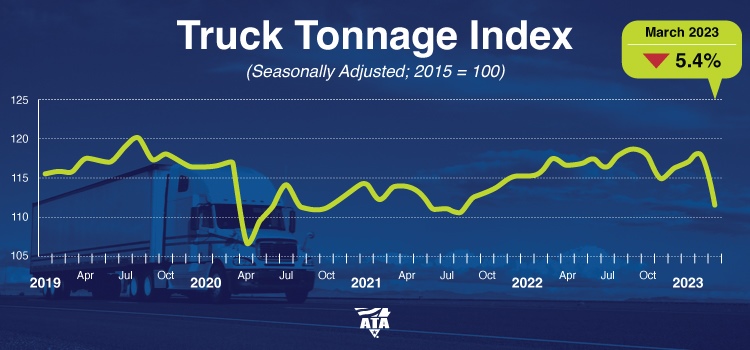Washington — American Trucking Associations’ advanced seasonally adjusted (SA) For-Hire Truck Tonnage Index fell 5.4% in March after increasing 0.9% in February. In March, the index equaled 111.6 (2015=100) compared with 118 in February.

“After increasing a total of 2.6% during the three previous months, March’s sequential decline was the largest monthly drop since April 2020 during the start of the pandemic,” said ATA Chief Economist Bob Costello. “Falling home construction, decreasing factory output and soft retail sales all hurt contract freight tonnage – which dominates ATA’s tonnage index – during the month. Despite the largest year-over-year drop since October 2020, contract freight remains more robust than the spot market, which continues to see prolonged weakness.”
Compared with March 2022, the SA index decreased 5%, which was the first year-over-year decrease since August 2021. In February, the index was up 1.9% from a year earlier. During the first quarter, tonnage was 0.6% below the same three month period in 2022.
The not seasonally adjusted index, which represents the change in tonnage actually hauled by the fleets before any seasonal adjustment, equaled 117.2 in March, 9.3% above the February level (107.2). In calculating the index, 100 represents 2015. ATA’s For-Hire Truck Tonnage Index is dominated by contract freight as opposed to spot market freight.
Trucking serves as a barometer of the U.S. economy, representing 72.2% of tonnage carried by all modes of domestic freight transportation, including manufactured and retail goods. Trucks hauled 10.93 billion tons of freight in 2021. Motor carriers collected $875.5 billion, or 80.8% of total revenue earned by all transport modes.
ATA calculates the tonnage index based on surveys from its membership and has been doing so since the 1970s. This is a preliminary figure and subject to change in the final report issued around the 5th day of each month. The report includes month-to-month and year-over-year results, relevant economic comparisons, and key financial indicators.